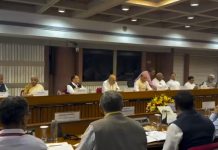 The Delhi High Court has come to the aid of a woman who is set to remarry soon by waiving the cooling off period for divorce from her estranged husband. Justice Prateek
The Delhi High Court has come to the aid of a woman who is set to remarry soon by waiving the cooling off period for divorce from her estranged husband. Justice Prateek
Jalan noted that there does not appear to be any likelihood of reconciliation between the estranged couple and relied on a verdict of the Supreme Court which had ruled that divorce can be granted without the mandatory 18-month period of separation between the parties.
The apex court had, in 2017, said that the six month “cooling off” period can be waived by the courts in cases of divorce through mutual consent. The high court allowed a petition by the woman for waiving the statutory period of six months under Section 13B(2) of the Hindu Marriage Act, 1955. It set aside an order of a family court which had rejected the woman’s application.
The high court said a holistic reading of the apex court’s judgement leads to the conclusion that purposeless marriage which has no chance of reunion ought not to be prolonged. The man and woman had got married in July 2017 and started living separately from October 25, 2017. During the proceedings under the Domestic Violence Act, 2005, the parties settled their disputes through mediation.
A settlement took place that the marriage be dissolved by mutual consent and it was agreed that the man would pay Rs 3.5 lakh to the woman. They approached the family court to dissolve the marriage and after completion of first motion, the parties filed an application for waiver of the statutory period of six months.
The woman intended to remarry another person on May 2 but a day before, the family court rejected the plea for wavier of the statutory period of six months. The high court said the safeguards contained in the statue are intended to explore every avenue of reconciliation and avoid an impulsive decision to break a marriage.
“In the present case, there does not appear to be any likelihood of such reconciliation. The parties have lived separately since October 25, 2017 and the composite period of 18 months expired on April 25, 2019. The petitioner (woman) has also expressed her intention to enter into another marriage with a non-resident Indian, who is resident in Australia. The counsel submits that, although the marriage had been fixed for May 2, it could not be solemnised on that date due to the fact that the present divorce proceedings had not concluded,” it said.
It was submitted before the court that the prospective bride-groom is in India until May 10 and the insistence on completion of the waiting period of six months would only prolong the woman’s agony, contrary to the dictum of the Supreme Court. The court noted that the mandatory period of six months would also be over on May 22, therefore, what is being sought in this petition is a waiver of about 15 days.
“The Supreme Court has clearly held that the period mentioned in Section 13B (2) is not mandatory but directory, and that a court may exercise this discretion in the facts and circumstances of each case, when there is no possibility of the parties to resume cohabitation and there are chances of alternative rehabilitation. In the facts and circumstances of the present case, therefore, the woman’s application for wavier of the mandatory period of six months ought to have been allowed,” it said.
Hearing a case in September 2017, the Supreme Court had ruled that a six-month waiting period for Hindu couples seeking divorce is not mandatory, laying down directions for lower courts to speed up separation if both spouses agree upon the terms. The decision had brought significant respite to couples who file for divorce “by mutual consent”.
“The period mentioned in Section 13B(2) is not mandatory but directory, it will be open to the Court to exercise its discretion in the facts and circumstances of each case where there is no possibility of parties resuming cohabitation and there are chances of alternative rehabilitation,” the bench of judges Adarsh Goel and UU Lalit had said at the time.
“That an application for waiver of the six-month period set out in the Hindu Marriage Act can be given a go-by if parties have genuinely settled their differences including alimony, custody of child or any other pending issues between the parties, and the waiting period will only prolong their agony.”
“If there are no chances of reunion and there are chances of fresh rehabilitation, the court should not be powerless in enabling the parties to have a better option.”
The court had said that every effort has to be made to save a marriage, but pointed out that “if there are no chances of reunion and there are chances of fresh rehabilitation, the court should not be powerless in enabling the parties to have a better option”.
As per the Hindu Marriage Act, a divorce petition can be filed at a district court on the ground that a couple has been living separately for one year or more, has not been able to live together and has mutually agreed the marriage should be dissolved. After the petition is filed, the couple has to wait for six months before the court hears or decides.
About ‘cooling off’ period
♦ Hindu couples who have mutually agreed to separate need not wait anymore for the mandatory “cooling off” period of six months before divorce.
♦ Previously, once a couple moves to a court of law for divorce under the Hindu Marriage Act, they have to wait for a minimum period of six months.
♦ Divorce by mutual consent was introduced as an amendment to the Hindu Marriage Act in 1976.
♦ The waiting period under Section 13B was mandated to prevent couples from taking any hasty decision to end their marriage.
♦ The waiting period was for them to have enough time to think through their decision to separate.
♦ Divorce was granted only after the ‘cooling off’ period and once the court found there was no further chance for reconciliation.
♦ In September 2017, a Bench of Justices AK Goel and UU Lalit observed that “The waiting period will only prolong their agony.”
♦ The court held that the waiting period should be done away with in cases where there is no way to save the marriage and all efforts at mediation and conciliation have run their course.
♦ Specially where parties have genuinely settled their differences including alimony, custody of child, etc, between themselves; and already a year and a half has passed since their first motion for separation.
♦ The latest verdict was based on the September 2017 Supreme Court decision.













